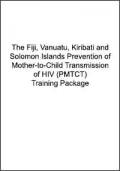Tools - Released in 2008
HIV is the greatest threat to development facing the world today. Most children living with HIV were infected by their mothers who are living with HIV. These children get infected during pregnancy, childbirth or during breastfeeding. For the mother to infect the child, she might have been infected before she got pregnant, when she was pregnant or even when she was breastfeeding. We know that we can prevent HIV in children by preventing the mother from initial infection, by preventing unintended pregnancies in women with HIV and, by ensuring that pregnant women with HIV have the care that prevents mother-to-child transmission. We can now considerably reduce the chances of a baby being infected by his/her mother. Globally, this intervention has come to be known as PMTCT—prevention of mother-to-child transmission. Without PMTCT about 35% of babies born to women with HIV will be infected. With PMTCT this is reduced to about 5%.
The Fiji, Vanuatu, Kiribati and Solomon Islands PMTCT Training Package is based largely on the 2007 update of the PMTCT Generic Training Package (GTP) that was developed under the direction of the World Health Organization and the U.S. Centers for Disease Control and Prevention for adaptation by countries and regions across the globe. This PMTCT Training Package is expected to play a key role in accelerating the scale up of PMTCT services in the Pacific region through training of healthcare workers to implement appropriate, quality services for PMTCT.
Downloads
Organizations
- United Nations Children’s Fund (UNICEF)






